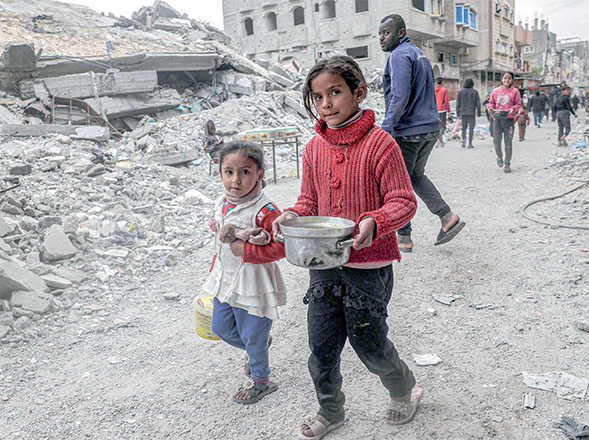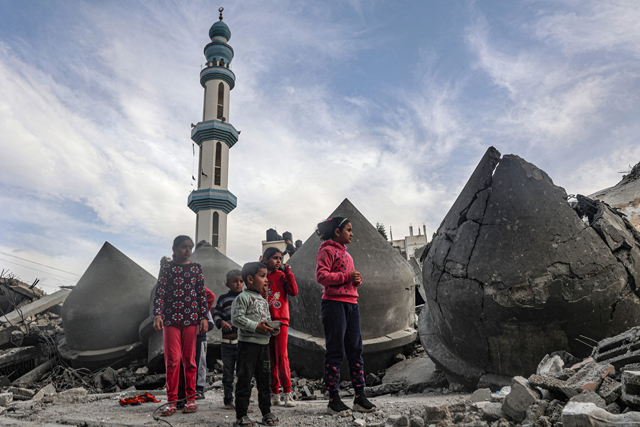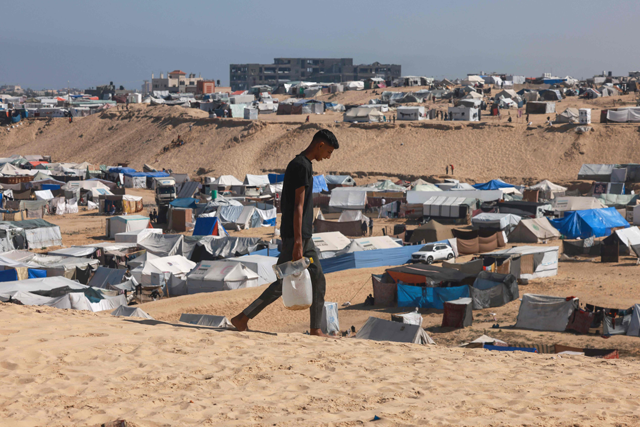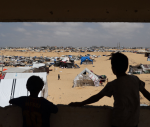You are here
Truce efforts ongoing as first sea aid unloaded for hungry Gazans
By AFP - Mar 17,2024 - Last updated at Mar 17,2024

Children walk past the rubble of a collapsed building with a pot of food provided by a charity organisation ahead of the fast-breaking ‘Iftar’ meal during the Muslim holy month of Ramadan, in Rafah in the southern Gaza Strip on Saturday (AFP photo)
Israel said it would send a delegation to Qatar for another round of talks on a possible deal. It also advanced plans for a military operation in Rafah, where most of Gaza's population has sought refuge from more than five months of war and deprivation.
The US charity World Central Kitchen (WCK) on Saturday said its team had finished unloading almost 200 tonnes of food, the first shipment to arrive on a new maritime aid corridor from Cyprus.
“All cargo was offloaded and is being readied for distribution in Gaza,” WCK said in a statement.
AFP footage on Friday showed WCK’s partner, the Open Arms vessel, towing a barge with the aid close to the rubble-strewn shore of north Gaza. Open Arms had sailed from Cyprus on Tuesday.
The United Nations has reported particular difficulty in accessing northern Gaza for deliveries of food and other aid.
Residents say they have resorted to eating wild plants and animal fodder, and some have stormed the few aid trucks that have made it through.
“Doctors are reporting that they no longer see normal-sized babies,” Dominic Allen, of the United Nations Population Fund, said after visiting Gaza’s north.
With the situation increasingly dire, multiple nations began daily aid airdrops over Gaza, and the new sea corridor is to be complemented by a temporary pier which United States troops are on their way to build.
No alternative
But air and sea missions are no alternative to land deliveries, UN officials and aid groups say.
A spokesman for the health ministry in Hamas-ruled Gaza said early on Saturday that 123 people had been killed over the previous 24 hours, including 36 during a strike on a house sheltering displaced people in Nuseirat, central Gaza.
Witnesses reported air strikes and fighting in the southern Gaza Strip’s main city Khan Yunis as well as areas of the north.
In negotiations aimed at securing a truce and hostage deal, Hamas has put forward a new proposal for a six-week ceasefire and the exchange of about 42 Israeli hostages for a larger number of Palestinian prisoners held by Israel, an official from the Islamist group told AFP.
Vowing to destroy Hamas, Israel has carried out relentless bombardment and a ground invasion that has killed at least 31,490 people in Gaza, most of them women and children, according to the health ministry.
Until Friday Hamas had insisted no further hostages would be exchanged without a permanent ceasefire and Israeli withdrawal from Gaza.
‘Not self-defence’
Now the militants are saying that, during a six-week truce, Israeli forces would need to pull out of “all cities and populated areas” in Gaza, according to the Hamas official.
The Hamas proposal also calls for ramped up humanitarian aid, the official added.
Israel has so far rejected withdrawing troops from Gaza, saying such a move would amount to victory for Hamas.
Prime minister Benjamin Netanyahu’s office said Israel would send a delegation to Qatar for another round of talks on securing the hostages’ release.
Israel did not send a team to recent talks in Cairo, which failed to secure a truce for the Muslim fasting month of Ramadan.
The United States, which provides Israel with billions of dollars in military assistance, has grown increasingly critical of Netanyahu over his handling of the war but has not supported an immediate and permanent ceasefire.
Irish Prime Minister Leo Varadkar, who favours such a measure, said after meeting US President Joe Biden in Washington that “none of us like to see American weapons being used in the way they are” which, he said, “is not self-defence”.
Biden praised unusually critical comments by US Senate leader Chuck Schumer, who had described Netanyahu as one of several “major obstacles” to peace.
“I think he expressed serious concern shared not only by him, but by many Americans,” Biden said.
Blockaded for years
Marking the first Friday of Ramadan, thousands of Muslim worshippers gathered in the revered Al Aqsa Mosque compound in Israeli-occupied East Jerusalem.
The site has seen clashes during Ramadan in years past but Friday went peacefully. Some younger men were turned away by the thousands of police officers deployed and conducting security checks.
Netanyahu’s office said on Friday he had approved the military’s plan for an operation against Hamas in Rafah, where around 1.5 million people are sheltered, many in rough tents near the Egyptian border.
There were no details or a timeline for the long-threatened operation.
The White House, which has said an assault on Rafah would be a “red line” without credible civilian protection measures, said it had not seen the plan.
World Central Kitchen founder Jose Andres said the seaborne aid which reached Gaza is the equivalent of 12 trucks but “we could bring thousands of tonnes a week”.
Prior to the war a daily average of around 500 trucks entered Gaza, the UN has said, but the current number is far below that.
Before the Open Arms reached Gaza, Andres told NBC’s “Meet the Press” that this would be the first attempt to reach “the shores of Gaza in years, because there’s been a navy blockade”.
Israel has blockaded Gaza since 2007, the year Hamas took control, and has imposed a near-total siege since October. Israel’s military said the aid delivery was not a blockade breach.
Related Articles
GAZA STRIP, Palestinian Territories — Israeli prime minister Benjamin Netanyahu vowed on Sunday to send ground forces into Gaza's southern R
GAZA STRIP, Palestinian Territories — American and Israeli negotiators are expected in Cairo over the weekend for a renewed push to reach a
BEIRUT — A senior Lebanon-based Hamas official said on Wednesday that Israel's response to the latest proposal from the Palestinian group fo

















